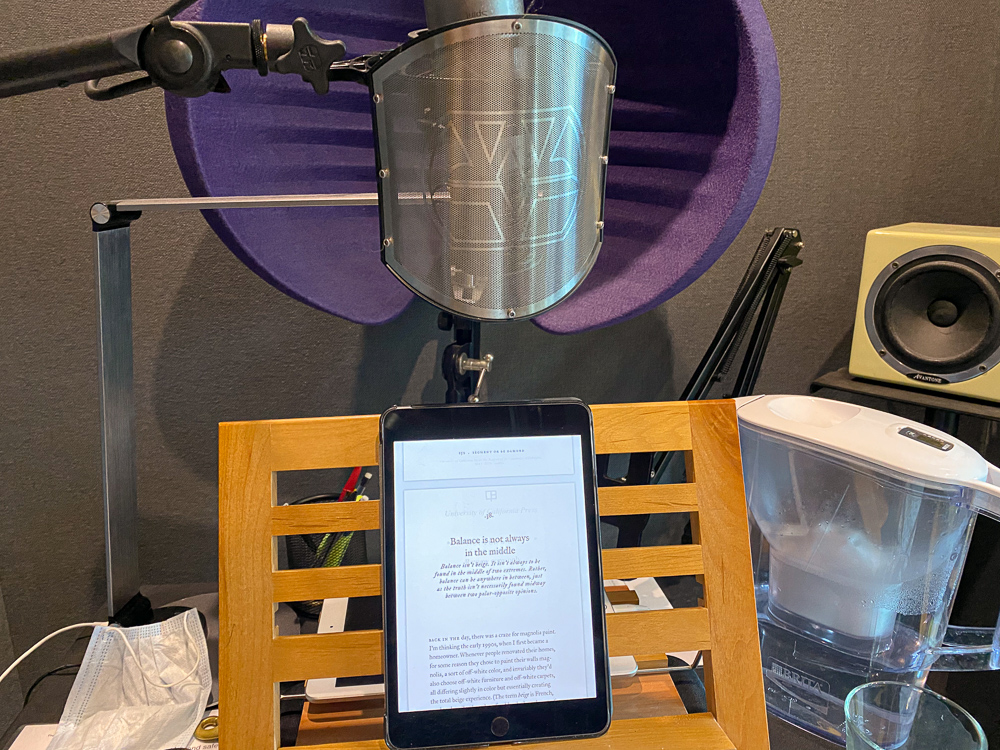Recording my audiobook – Jamie Goode’s wine blog

[ad_1]
A while back I got an interesting email. Audible, the leading audiobook company, had bought the rights to my latest book: The Goode Guide To Wine: A Manifesto Of Sorts. Only one of my books had also been an audiobook – Flawless. That was read by an actor, and I couldn’t bring myself to listen to it. For the manifesto, it’s such a personal book, I really wanted to read it.
So I replied immediately: please, please can I read my own
book? Initial signs weren’t encouraging. So I pressed. Eventually they agreed
to let me audition. I had to send Audible a five minute sample of me reading
for them to check. After a while, I got a response: could I come into a studio
and do the recording?
I was booked in for two successive Fridays, and last week
headed into a studio in Camden. It was a bit weird because the producer/engineer
was working remotely, controlling the recording set up in the master room from
home. So I was alone.
I am not a trained actor. Actors are trained to read well,
and it really felt like I was a bit out of my depth. I think that acting is a
bit like writing. I find with writing, that because people can all put words on
a page, they all feel like they are writers. With acting, because everyone can
speak, they feel they could be an actor. I was under no illusions about how
hard this was going to be. Try it: read a paragraph from a book out loud. Then read
a page. Then read a chapter. It’s incredibly hard to do well.

I was connected with the producer over headphones, in a
small sound-proof booth with carpet on the walls, where I was to speak into an
expensive condenser microphone via a metal pop shield and in front of a purple reflection
filter. After a sound check, it was down to business.
I was quite nervous. I really wanted the book to be read by
me because if I was buying an audibook I’d want to hear it in the author’s
voice. But I don’t think I have a great voice (doesn’t everyone hate their own
voice?) and I’m untrained at reading aloud.
How does the recording process work? The producer follows
along, and if you’ve mumbled a word, or emphasized it wrongly, or stumbled, or
made any other of a long list of potential mistakes, you are taken back to the
beginning of the sentence, or a clause in the sentence, and dropped back in to continue.
Most of the time you know when you’ve made an error and don’t
need the producer to pick you up. Some words are also tremendously difficult to
say clearly, such as ‘phenomenon’. The whole process is quite exhausting, and
requires concentration.
The other thing you don’t think about is the physical effect
of speaking for so long on your voice. Lubrication of the mouth is vital for
speaking, and affects the way your voice sounds. So you need to keep drinking,
but water alone doesn’t lubricate, and after a few hours there’s a noticeable
vocal fatigue. This adds to the challenge of reading well.
The first day finished at 5 pm and I was exhausted, but we’d
made good progress. The producer was very professional and pleasant to work
with. In the one day, we’d polished off two-thirds of the book. I returned
yesterday for day two, and this went pretty smoothly. After finishing the last
chapter, we went back to do some corrections from the editor: a word here that
was fumbled and we’d missed, or a slight noise on the recording, or a weak emphasis
of something important. I was finished by 1530, and much less tired than after
the first day.
So soon the audiobook will be out. I don’t think I’ll listen to it – I’m too close to it, and I still can’t bear the sound of my voice. But it has been a great experience recording it, and I think it’s also good to have the author reading their own book if possible.
Reminder: this blog is irregularly updated, but there are daily updates on the main wineanorak site.
[ad_2]




